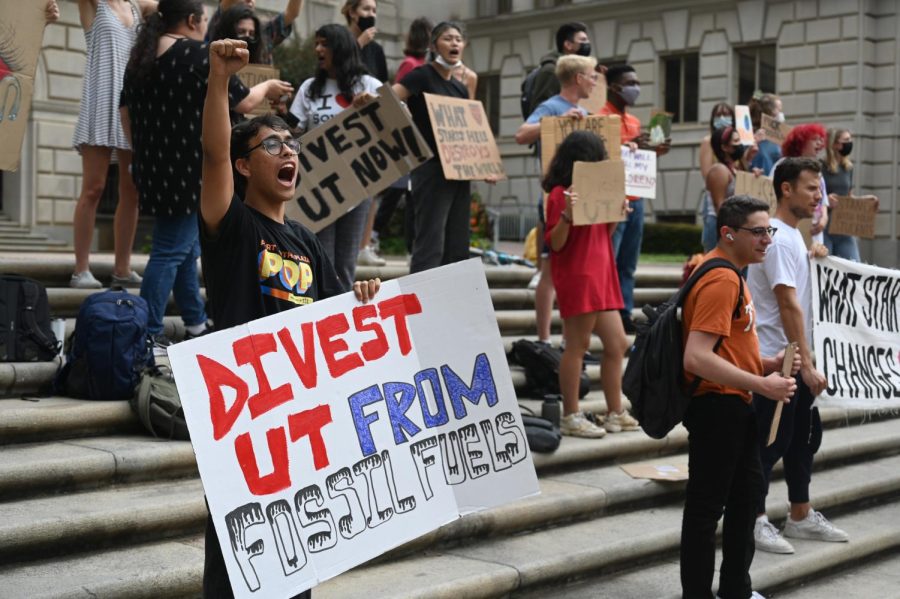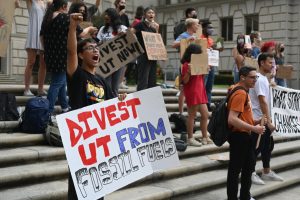Will UT ever cut ties with fossil fuels?
A protester chants and holds a sign during a climate action rally on Oct. 26, 2021.
February 7, 2023
In 1876, the Texas Constitution gifted over two million acres of West Texas land to UT and A&M to support their university endowments. Nearly 50 years later, the Santa Rita No. 1 oil well struck oil on these lands in Reagan County, marking the beginning of UT System’s long relationship with the industry.
With over 20,000 oil wells drilled to date on University Lands and 24,000 potential or future drilling locations on site, the oil lands owned and leased by the University pump out around 65,000 barrels of oil equivalent a day.
UT System’s $42 billion endowment, second only to Harvard University (a title the Ivy League college could lose to UT), owes most of its profits to the System’s deep ties with oil and gas.
In recent years, following a worldwide trend for universities to divest from the fossil fuel industry, UT students have urged University administration to be increasingly transparent about their oil and gas revenues. Student climate activists hope the University may eventually stop fracking on University Lands, shift divestments to clean energy and mitigate the environmental harm caused by fossil fuel production. But Texas’ long-standing relationship with oil, plus the state’s conservative government, makes the push for divestment a tough one.
The revenue flows into the System’s Permanent University Fund and the Available University Funds. The PUF has received between $500 million and $2.1 billion from oil and natural gas activities each year since 2010, said Catherine Frazier, UT Systems director of media relations.
The System uses the money in the PUF to financially support UT-Austin and its other institutions, which includes the University of Texas/Texas A&M Investment Management Company investing the money into various companies and assets — less than 5% of UTIMCO investments are directly in oil and gas, Frazier said. The AUF made up 13% of the University’s nearly $3.6 billion budget for the 2022-23 school year.
Though Gov. Greg Abbott and other members of the state government have taken steps to maintain the oil and gas industry in Texas, scientists have proven that the fossil fuel industry — the burning of oil and natural gas and the subsequent release of greenhouse gasses — is the largest contributor to global climate change.
In a quote from the American Physical Society on the NASA website, scientists said that climate change is the human-caused warming of the Earth, and its effects may cause significant environmental, social and economic damage around the world. The NASA website also states that 97% of actively publishing climate scientists agree that human-caused climate change is real and is warming the planet.
The fight
One student organization at the forefront of the push for the University’s divestment is Students Fighting Climate Change. SFCC board member Eleanor Hammersly said the organization wants to see the University’s actions align with its morals.
“Fracking and fossil fuels are climate change causing industries,” music performance senior Hammersly said. “As a University that boasts ‘What starts here changes the world,’ and that (they) want to ‘transform lives for the betterment of society.’ We just want the University to acknowledge the climate crisis and acknowledge its own perpetuation of the crisis in the form of West Texas lands.”
During an interview with The Daily Texan last fall, President Jay Hartzell acknowledged that the Earth’s climate is changing, including warming temperatures, but didn’t state support for the divestment movement.
“As a finance professor, I’m not convinced that the best way to drive change is to have a certain sector of the investment community not invest in an asset class,” Hartzell said.
Hartzell said that as a Texas school, UT must “maintain a leadership role in the energy sector,” which includes both traditional and sustainable energy.
“I think if the goal is to drive a conversation around climate or energy policy or energy usage, there are more effective tools than trying to advocate a position of not investing in, for example, energy companies,” Hartzell said in the interview.
Institutions like Harvard University, Boston University, Stanford University and the University of Michigan have made the commitment to divest from the fossil fuel industry, but despite the continued demands by UT students for divestment, the University has made no such commitment.
Harvard junior Phoebe Barr is a part of the Fossil Fuel Divest Harvard movement, which resulted in the University pledging to divest from fossil fuels in 2021. Barr said a variety of things contributed to Harvard’s agreement to divest — including a storming of the football field during a Harvard versus Yale game nearly four years ago — but it was legal action that she believed pushed Harvard to make the commitment.
In the spring of 2021, the organization filed a legal complaint against the University on the basis that Harvard’s fossil fuel investments were illegal.
“Harvard, as a nonprofit, has an obligation to invest in things that are prudent and that work in its students’ best interests,” Barr said. “The fossil fuel industry is neither prudent nor in the best interest of students.”
Because Harvard is a nonprofit institution, their revenue is expected to benefit the students of the University, Barr said.
Harvard is a private university, so they are not tied to a state government that controls funding like the UT System.
Other institutions have chosen to divest from fossil fuels due to student demands, governmental pressure or pressure from faculty, alumni and donors according to Georges Dyer, executive director of the Intentional Endowments Network said.
“Oftentimes, that student pressure is instrumental in getting the conversation going,” Dyer said. “And then what we often see is (that) investment committees, the fiduciaries and the endowment, look at it and evaluate the financial side. They see the financial benefits in the investment case, and that gives them comfort that this is a smart way to go over the long term.”
The logistics
At UT, the University’s political ties could play a role in its relationship to fossil fuels, David Spence, UT energy law professor, said.
“Since UT is a state institution, it’s overseen by a Board of Regents who are appointed by state politicians, most of whom are in favor of developing Texas’ oil and gas resources,” Spence said. “Their main goals are to maximize returns, and divesting from oil and gas is probably not a majority viewpoint within the institutions.”
Abbott is a staunch supporter of the fossil fuel industry and has disregarded climate change. He also appointed members to Texas universities, including UT’s, as a favor to campaign donors, according to reporting by The Texas Tribune. These board members make decisions for how the System invests its money and largely align with Abbott’s conservative views. However, Frazier said that UTIMCO’s investment decisions are not swayed by social or political ties.
“Many external firms that UTIMCO hires to manage endowment assets consider environmental factors in their investment processes, recognizing that the consideration of environmentally and socially sustainable factors is a good business practice that impacts profitability and long-term competitiveness,” Frazier said.
In more Democratic states, like Maine, state governments have encouraged universities to divest from fossil fuels, Dyer said. This year, the University of Maine pledged to fully divest from fossil fuels by 2030.
Dyer, who helps clients align their endowments with their companies or organizations’ mission, which may include divesting from fossil fuels, said that in the long run, shifting investments from the oil and gas industry to clean energy is not only a morally beneficial decision but a fiscally responsible one too.
“As we transition to a clean energy economy, the share of fossil fuels in the market, overall, will peak and decline,” Dyer said. “As the world uses fewer and fewer fossil fuels … the value will go down in those companies and they will become less and less of a percentage of a given portfolio.”
Dyer compared the University’s fossil fuel ties to the country of Norway, which creates revenue from oil extraction but dedicates large chunks of its investments to clean energy. While the country participates in the fossil fuel industry through oil and gas extraction, it tries to remain environmentally friendly via its investments.
The University could implement something similar, Dyer said, by continuing to extract oil on University lands but mitigating the harm by investing in clean energy. It’s unlikely the University would ditch its oil profits, but it could be easier to shift its investments in order to be more environmentally friendly.
There are nine clean energy projects on the lands in West Texas, according to University Lands.
Divestment may be a long-term goal, Hammersley said, but it is still a goal, and as Dyer said, it might be the best financial decision for the future of the University.
“I always refer to divestment as SFCC’s ‘Northstar,’ because we always have that at the forefront of our work,” Hammersly said. “It’s not going to be achieved within our careers at the University. It’s not going to be achieved within four years, but it’s something we always push for.”
The future
Since 2019, SFCC has organized climate strikes and drum circles around campus to promote community and raise awareness for their cause. They are sometimes seen carrying signs promoting climate equity on the steps of the UT Tower.
SFCC has also initiated conversations with UT’s administration to discuss climate action on campus, though the University’s higher-ups have not always been responsive. This semester, SFCC will continue to host Friday climate strikes on campus, as well as a Climate Coalition this March, which will host speakers from the Sierra Club and other climate equity groups.
Though the University and System have not agreed to divest from fossil fuels, sustainability officers like Jim Walker acknowledge the threat of climate change and are attempting to reduce carbon emissions on campus with efforts such as increased recycling and composting, which reduce landfill waste.
“Our office works on what we can effectively shape and manage at the institution level,” Walker said. “We’re thinking about the emissions framework. What’s the long-term future of our on-campus power plant? How do we reduce the emissions that come from commuting or other kinds of activities that people on campus can actually make decisions about and do something about.”
Walker said a committee of faculty, staff and students are currently working to establish a campus emissions framework in order to analyze and improve upon the University’s current on-campus greenhouse gas contributions.
Walker said the University has been tracking its emissions for a long time, and in a new strategic climate plan, Change Starts Here, the steering committee is working to understand the University’s emission of greenhouse gasses.
“I will never fault students for wanting to continue to ask questions,” Walker said. “ We recognize divestment. It’s a national nationwide issue. It’s been applied to numerous different movements. So we understand why students are interested, but we also have to focus on what we can effectively change.”
Hammersly said that while the University has ample room to improve in its oil extraction and UTIMCO investments, the work of individuals within the University’s sustainability office is notable and important.
“Individual change keeps communities going,” Hammersly said. “It keeps hope and cultivates lots of beautiful practices and relationships that are really meaningful and accessible for everyone.”
But despite the efforts of the sustainability office, Hammersly said the push for divestment and accountability continues.
“Once you know (about) the West Texas land, … it feels like there’s a huge curtain that (UT’s) hiding behind,” Hammersly said. “We can say we are a university that prioritizes sustainability and going green, but that can’t be said without acknowledging what is going on behind the scenes.”












